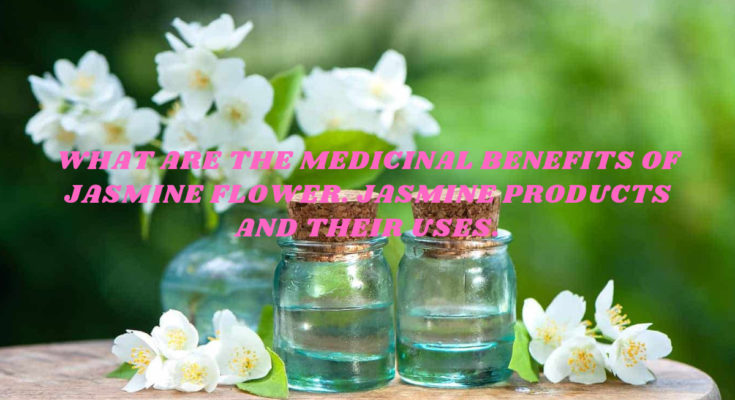Jasmine is a fragrant flower that is native to tropical and subtropical regions of Asia, Africa, and Australia. There are many species of jasmine, but the most commonly known is the Jasminum officinale, which is also known as the common jasmine or poet’s jasmine.
Jasmine flowers are known for their sweet and intoxicating fragrance, which has been used for centuries in perfumes, cosmetics, and aromatherapy. In some cultures, jasmine is also used in religious ceremonies and as a symbol of love and purity.
The flowers are typically white or yellow and have a star-shaped appearance with long, slender petals. They bloom in the summer and fall, and can grow on shrubs or vines. Jasmine is also known for its medicinal properties, and its extract is sometimes used to treat anxiety, depression, and other health conditions.
Overall, jasmine is a beautiful and fragrant flower that has been treasured for its scent and symbolism throughout history.
MEDICINAL BENEFITS:-
Jasmine has been used for medicinal purposes in traditional medicine systems for many centuries. Here are some of the potential medicinal benefits of jasmine:
1. Anxiety and stress relief: Jasmine is believed to have calming and relaxing effects on the mind and body, and its aroma has been used in aromatherapy to help reduce anxiety and stress.
2. Antidepressant properties: Some research suggests that jasmine may have antidepressant effects and can help improve mood and alleviate symptoms of depression.
3. Skin health: Jasmine oil is often used in skincare products due to its moisturizing and anti-inflammatory properties. It is believed to help soothe irritated skin and reduce the appearance of fine lines and wrinkles.
4. Pain relief: Jasmine oil may have pain-relieving properties and has been used to help alleviate headaches, menstrual cramps, and other types of pain.
5. Sleep aid: Jasmine’s calming effects may also help improve sleep quality and aid in insomnia treatment.
6. Digestive health: Jasmine tea has been used in traditional medicine to help improve digestion and alleviate gastrointestinal issues such as bloating and stomach cramps.
It’s important to note that while jasmine has a long history of use in traditional medicine, more research is needed to fully understand its potential medicinal benefits and to determine appropriate dosages and safety precautions. It’s always a good idea to consult with a healthcare professional before using any new herbal remedies.
USES:-
There are various ways to use jasmine for its medicinal benefits. Here are a few common methods:
1. Aromatherapy: Jasmine essential oil can be used in aromatherapy by adding a few drops to a diffuser or by inhaling the aroma directly from the bottle. This method is commonly used to reduce anxiety and stress.
2. Topical application: Jasmine oil or extract can be applied topically to the skin to improve its health and appearance. It is often added to skincare products such as lotions, creams, and serums.
3. Herbal tea: Jasmine tea is a popular beverage that is made by steeping jasmine flowers or leaves in hot water. It can be consumed to help improve digestion, alleviate stress, and promote sleep.
4. Massage oil: Jasmine oil can be mixed with a carrier oil such as coconut oil or almond oil to create a massage oil. This method is commonly used to help relieve muscle tension and pain.
It’s important to note that the appropriate dosage and method of use may vary depending on the individual and the specific condition being treated. It’s always a good idea to consult with a healthcare professional or an herbalist before using jasmine or any other herbal remedies.
PRODUCTS:-
There are various jasmine products available that can be used for medicinal purposes, skincare, or as fragrances. Here are some examples:
1. Jasmine essential oil: This is a highly concentrated oil that is extracted from jasmine flowers. It is often used in aromatherapy and can be used to improve mood, reduce anxiety, and promote relaxation.
2. Jasmine tea: This is a type of tea that is made by infusing jasmine flowers or leaves in hot water. It has a delicate floral aroma and is commonly consumed for its health benefits.
3. Jasmine soap: Jasmine oil is often added to soap to create a fragrant and moisturizing product. It can help improve skin health and is often used in aromatherapy for its calming effects.
4. Jasmine lotion or cream: Jasmine extract is a common ingredient in skincare products due to its moisturizing and anti-inflammatory properties. It can help soothe irritated skin and improve its appearance.
5. Jasmine perfume: Jasmine has a sweet and intoxicating fragrance that is often used in perfumes and fragrances. It can be worn as a personal scent or used to freshen up a room.
It’s important to note that not all jasmine products are created equal, and the quality and potency can vary depending on the brand and source. It’s important to choose high-quality products from reputable sources to ensure that you are getting the full benefits of jasmine



